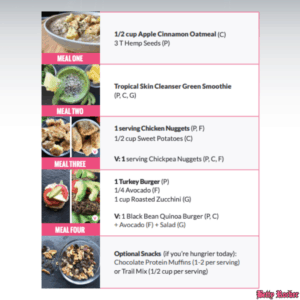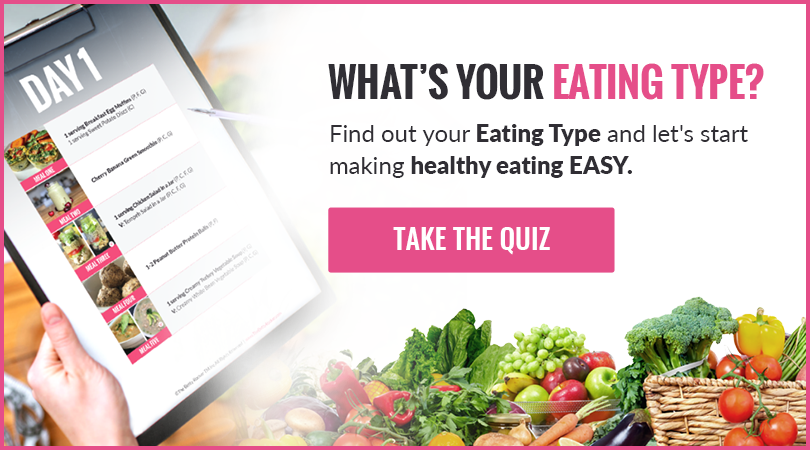 Everything I have ever learned about food, nutrition and the body has shown me that the MOST direct way to affect the long-term outcome of our health, support your workouts, reduce long-term health care costs and live a life with abundant energy comes from what we eat.
Everything I have ever learned about food, nutrition and the body has shown me that the MOST direct way to affect the long-term outcome of our health, support your workouts, reduce long-term health care costs and live a life with abundant energy comes from what we eat.
It is an enormous privilege to have access to so many choices and so much food. And with that abundance of choice, it can be overwhelming to know what the best things are to get for yourself while not breaking the bank.
Taking shortcuts with pre made food might seem convenient because they seem to be saving time or money – but they aren’t always the most nourishing, and can actually be undermining your health and fitness goals.
My goal for you is that what you’re eating is supporting every healthy body function you have going on – and that you can count on your insides working for you long-term – no matter what life throws your way. That’s why I’m such an advocate of cooking, getting food that’s as close to nature as possible as much as we can, and spending just a little time planning for success before we hit the aisles.
Top 10 Money-Saving Strategies
1. Have a plan going in.
Having a plan before I go shopping has been key for me in not overspending. This plan starts by choosing staple recipes for the week and building your grocery list around them.
It might feel like “work” to sit down and look up recipe options, and make a list of the food you want to buy – plus cook…but it’s the most important and rewarding work we can do for ourselves, for our health and for our longevity.
Not to mention, having a plan saves so much money.
When I stopped randomly ordering food, picking up meals to go and shopping for groceries aimlessly, I had more money in my pocket for other things that were important and enjoyable.
For some help with making your grocery list and picking good meals for the week ahead, check out the Body Fuel System!
2. Choose recipes you want to make for the week that have corresponding ingredients.
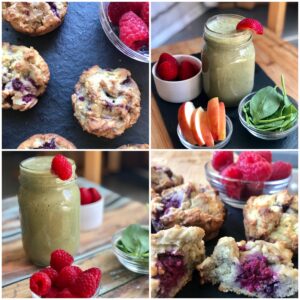
Start keeping a recipe log in a note application in your phone, because you can come up with a list of meals to make for the week faster and more easily when you have some good inspiration. Then you can refer back to them again and again.
When you’re coming up with your money-saving plan, it’s really helpful to choose recipes that have ingredients that overlap up so you can buy less items. When I’m planning my week, I choose a couple entrees that could share some of the same vegetables or protein sources, or have similar spices for example. Same thing with my smoothies – I’ll try to pair fruit that I also want to use in say a muffin recipe.
The Body Fuel System was actually designed this way because it was exactly how I was eating and was how I made my life easier. Once I had picked out the best recipes for the week for my breakfasts, entrees, smoothies and snacks, I’d just build my grocery list around the recipes. Sometimes I’d change ingredients in a recipe to be more cost effective so I could buy less ingredients but still enjoy a good variety of foods.
3. Organize your list for easy shopping and stick to it

Having the list and organizing it like this helps keep you away from the aisles or areas where things are stored that feel tempting.
Food companies spend thousands of dollars testing their packaging, catchphrases and marketing so you’ll want to buy things you don’t need. Stick to your list!
4. Always look for VALUE
For me, that’s what is in season, what is the best deal, and what I can afford. Even though it’s nice to buy organic as much as possible, sometimes the better value is found in local, non-organic produce.
An important note on buying organic: remember that most conventional grocery stores are going to mark up the price on organic items because they are NOT buying them in as large a quantity as a health food often store can. Sometimes you’ll get a better deal on the organic stuff by shopping somewhere that gets a large supply.
5. Make simple substitutions to your recipes to accommodate seasonal items.
If you wanted strawberries for example, but it’s winter, get some pears or apples and get creative.
It is always healthier for our bodies to eat the seasonal food – as the nutrient content is much higher.
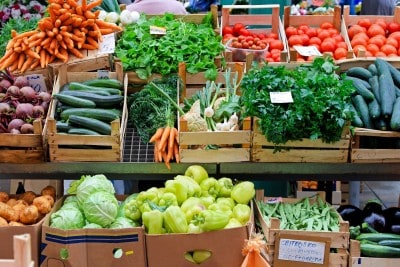
6. Speaking of higher nutrient content, I do recommend you buy organic eggs.
Organic eggs contain much more absorbable nutrients, they’ll minimize your exposure to antibiotics, synthetic hormones and pesticides – as well as delivering more protein. I get the extra large.
7. Buy some items frozen.
While getting fresh is awesome if you have the funds, there are always benefits to buying frozen. I often find great deals on wild-caught frozen fish, and of course the nice thing about frozen is that it’s definitely not going to go bad if you don’t have time to cook it right away.
This is especially true for greens and fruit, which make a great addition to smoothies and can easily go bad when purchased fresh.
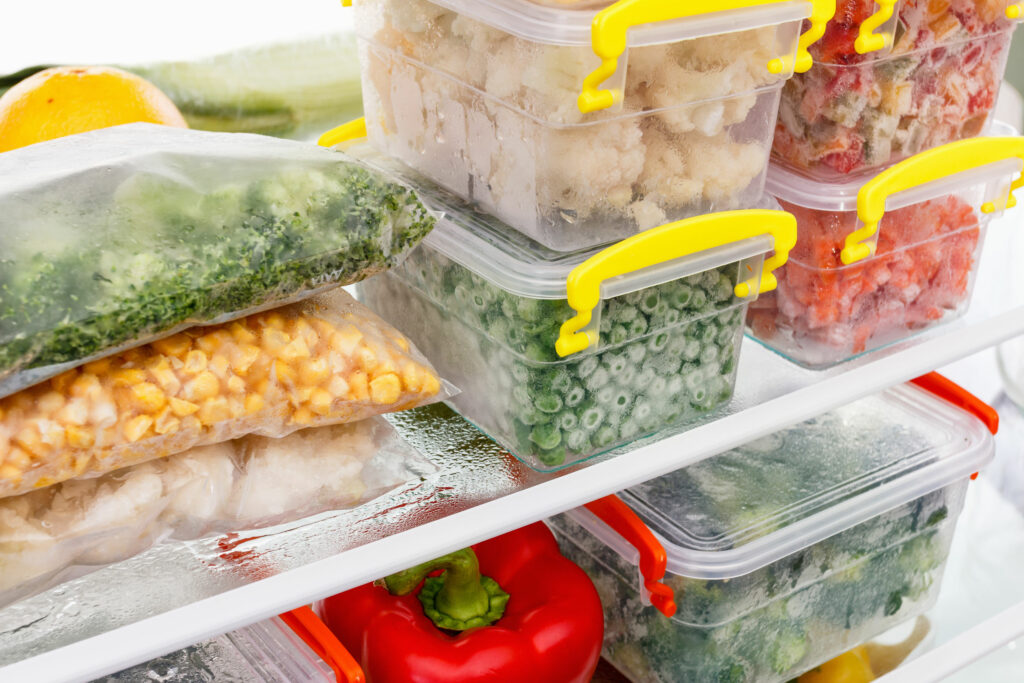
8. Buy specialty items like nuts and grains in bulk when possible.
Sometimes going to a health food store that has a bulk section will really save you money by taking advantage of this feature.
You can also get great deals on flour, seeds, rice, honey, nut butter and dried fruit by buying these things in bulk, reusing your containers, and following your plan for the week.
9. Set aside time to prep some of the food you bought when you get home.
This keeps you on point, and ensures nothing goes to waste. I choose entrees, staple carbs and usually one easy snack.
While I sometimes do prep as I go through the week, I often try to prep at least 2 staple carbs, 1-2 protein or entree dishes, and at least one snack. This saves me a lot of time later and ensures I’m making the most of my savings by not skipping that food in my fridge!
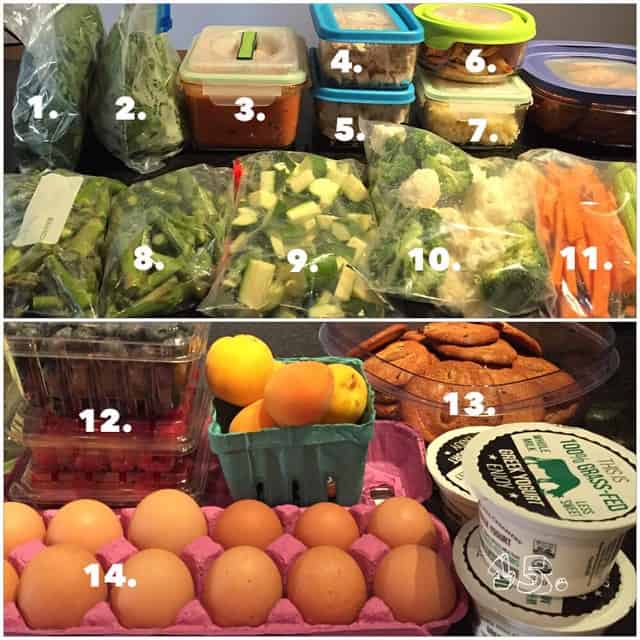
10. Never shop when you’re hungry 🙂
I bet this is a no-brainer to you, but it happens sometimes. I always make a point of getting something I can eat at the store before I shop, if I get there hungry.
Shopping while I’m anxious always throws me off my game. As long as I’m not hungry, my favorite thing to do is get (or bring from home) a foamy almond latte (with a sprinkle of cinnamon) and walk around sipping it.
For some reason, it makes grocery shopping feel like less of a chore, and more of something special and fun – as it should!
What are YOUR best money-saving strategies when it comes to food? And what items do you always insist on buying organic?
So there you have it – having a plan to follow helps me stay on point while I’m grocery shopping and save money, helps me stay balanced with my meals all week, helps me save money NOT going out to eat every day, and allows me to see the direct results on my body – in how it looks and feels.
Looking for some help making healthy eating easy?
